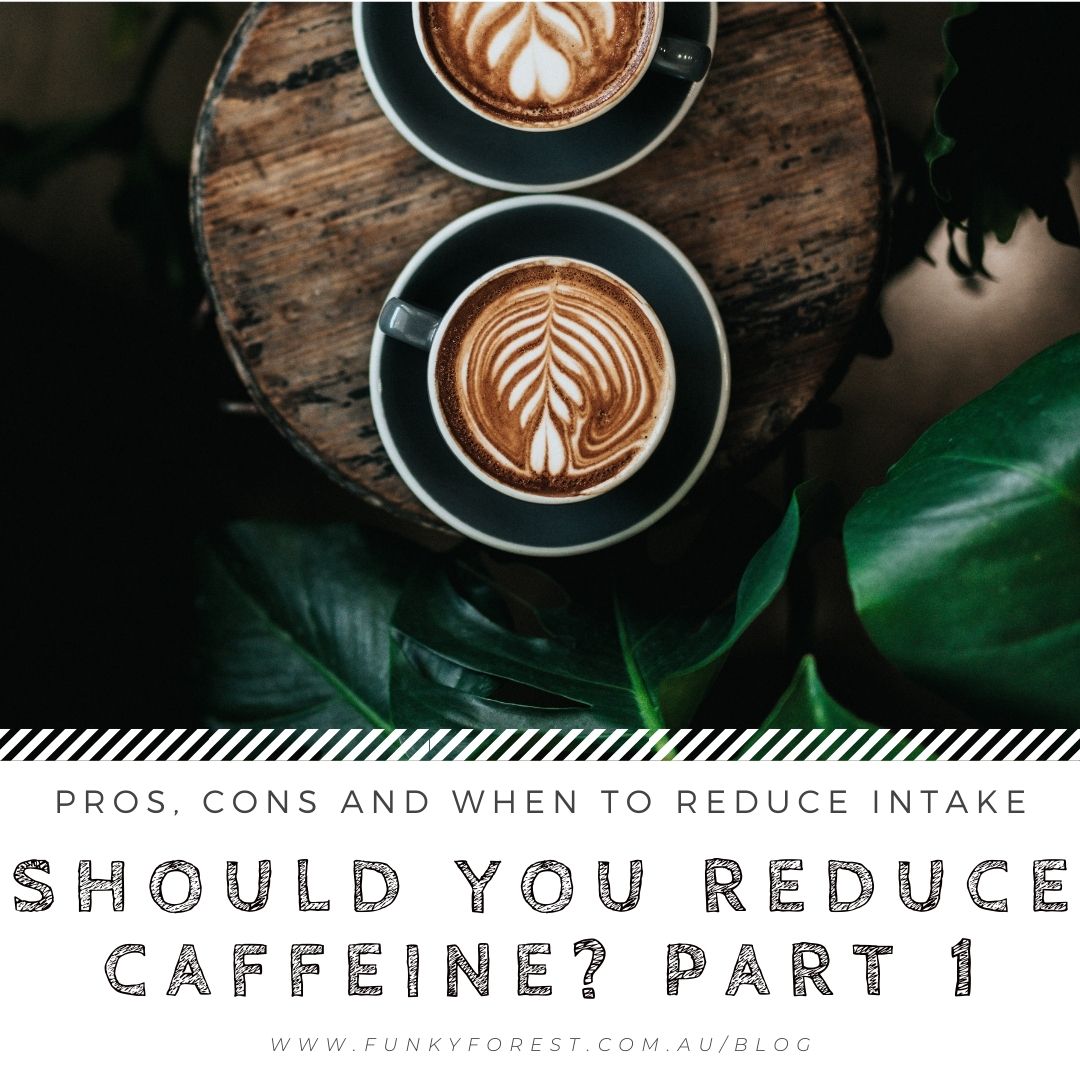In this 2-part series I discuss:
- Caffeine's positive uses
- Effects of short- and long-term consumption
- Downsides of caffeine use
- How to know if coffee is right for you
- Gentle ways to reduce your consumption, if you choose to
Already read part 1? Skip to part 2, here.
Coffee – is it “good” for us, or is it “bad”? Ah, the age old question. Do a quick Google search and coffee aficionados everywhere will be delighted to discover an abundance of research articles at their fingertips, all proselytising with near-rabid excitement the health benefits of drinking coffee. These studies link drinking coffee with reduced risk of diabetes, heart disease, and just about every disease under the sun. If all you did were look at the top search results for research on coffee drinking, you’d be convinced that coffee is a very healthy substance indeed.
Add to this the recent bulletproof coffee craze in which coffee is marketed as the biohacker’s ultimate weapon. Creator Dave Asprey goes so far as to say that bulletproof coffee is “a gateway drug for taking control of your biology”. The butter and coffee concoction is promoted as a breakfast-replacing superfood that not only enhances cognitive performance, but also extends your life span.
So should everyone be drinking 3-5 cups of coffee a day? Not so fast. One thing that’s important to understand about scientific research is that it deals in averages. In a typical study cohort, there may be a bunch of people who drink coffee and experience reduced risk factors for cardiovascular risk, whilst for others there are increased risk factors. When it comes to answering the coffee question, individual differences are what we should consider, rather than simply “the research”.
In the same way that other current dietary trends (like intermittent fasting, ketogenic or low carbohydrate diets) benefit some people whilst actually deteriorating the health of others, the effects of coffee on health aren’t the same for everyone and depend on a number of very individual factors. These factors include genetics, metabolism, and current health status.
In this article, I’ll discuss the pros and cons of coffee use. I’ll explain how your body responds to coffee intake, the stress response it elicits, and the impacts in various systems of your body. Then you can decide whether or not coffee consumption is right for you, and if you do decide to reduce your intake, I’ll explain how you can do so with minimal unpleasant symptoms.
Caffeine’s positive uses
We live more stressful lives than ever before. Deadlines, traffic jams, high work performance expectations (including being on-call 24/7), and double-income households with kids have become the norm. The accumulation of stress garnered by this kind of lifestyle creates incredible amounts of fatigue; fatigue that stops us from completing all the tasks we feel we need to do to keep our heads above water. In our fast-paced, time-poor society many people don’t believe they have (or simply don't have) the time or capacity to address the root causes of our fatigue - by say, working less, and resting more. So we look to stimulants.
Caffeine is the most widely used stimulant in western society, and coffee is the most popular vehicle for this stimulant. Caffeine activates the stress response, which is how it enhances short-term performance and concentration. But what most of us forget is that in activating the stress response to experience these “desirable” effects of caffeine, we also get a bunch of other unintended and potentially harmful effects.
What is the stress response?
The fight or flight response occurs when we find ourselves in critical situations – coming face to face with a tiger is the classic example of this, but getting abruptly cut off in traffic will do it too.
At the first sign of threat (or perceived threat), the SNS kicks into gear. Adrenaline and noradrenaline are released within fractions of a second, triggering the performance- and focus-enhancing effects coffee is so well known for. Heart and respiratory rates increase. Blood is diverted from the digestive system into the arms and legs to help you fight or flee. Your senses of hearing, sight and smell become keener. You become more alert and vigilant. Your appetite decreases (which is why many people manage to skip breakfast and “get by” on just a coffee in the morning). Immunity is boosted in the case that you are injured by the threat and need to mount an inflammatory response to fight an infection. Growth, digestion, and reproduction are inhibited, as the body diverts resources to immediate life-saving needs rather than “optional” ones.
The second system, the hypothalamic-pituitary-adrenal (HPA) axis, works slightly more slowly than the SNS, within minutes of detecting the threat. When that car cuts you off in traffic, a part of your brain called the hypothalamus releases a hormone that sets off a cascade that eventually tells your adrenal glands to release cortisol. The pancreas releases glucagon, and together with cortisol, these hormones shunt large amounts of sugar from your muscles and liver into the bloodstream to provide the energy needed for a massive physical response.
Other hormones such as prolactin are secreted by the pituitary gland, which play a role in suppressing reproduction during stress. The stress response also inhibits the release of sex hormones like oestrogen, progesterone and testosterone.
In a natural situation where the fight or flight response is triggered, the adrenaline and increased blood sugar secreted give us the energy to fight or flee and thus survive the threat. Moving our bodies in dynamic ways like sprinting or fighting allow the adrenaline and blood glucose to be used up so that our bodies can return to a state of homeostasis fairly quickly.
However, if we are activating this response when sitting at our desks or driving our cars, our muscles remain stationary - aside, perhaps, from those of your middle finger in traffic!. We don’t have a chance to “burn up” the sugar, and fully utilise the many hormones and neuroendocrine mediators that are being pumped out. Instead, the stress hormones and blood sugar remain in our systems for much longer. Interestingly, when the body finally gets a chance to recover from the acute stress, it responds to the need for repair by increasing appetite and storing fat (mostly in the abdomen).
Prolonged stress
Allostatic load can lead to HPA axis dysregulation, where the HPA axis either cannot turn off, or cannot turn on the stress response.
People who cannot turn off the stress response will pump out disproportionately large amounts of adrenaline as if they were in a chronic state of fight or flight. These people can experience relentless anxiety, agitation, and insomnia. Other people experience this as cortisol dominance which shows up as increased cravings for salty, fatty and sweet food, weight gain around the waist, and generally having more negative, stressed out thoughts.
If your allostatic load becomes too great, your body may actually turn down the adrenals in an effort to protect you from this wear and tear. Instead of having an overactive stress response, your HPA axis now does the opposite - you produce lower than normal levels of cortisol and adrenaline.
Although these are “stress” hormones, we still need a certain level of cortisol and adrenaline to stay healthy. If levels are too low, your immune system becomes compromised and you may feel more aches and pains. This can manifest as a chronic condition called fibromyalgia.
Because cortisol helps us feel awake and refreshed in the morning, low cortisol levels mean that you will feel exhausted no matter how many hours of sleep you’ve had. Waking up in the morning becomes increasingly difficult, and you might find yourself crashing mid-afternoon, or even all day long. Digestive problems, anxiety and overall stress usually get worse the longer the cortisol deficiency continues.
Caffeine and the stress response
Caffeine triggers the acute stress response just as if a tiger has just jumped out in front of us, which is why we experience those “benefits” of sharper focus and performance. Regular intake of caffeine creates a pattern where our bodies are repeatedly pushed into fight or flight mode, but without necessarily providing the “tiger” to motivate us to physically run or fight - actions that would dissipate the chemicals and sugar released in that stress state.
Caffeine allows us to push past our natural energy limits, which may be useful for short-term athletic performance and concentration. But if we repeat this pattern multiple times a day, day after day, our endocrine and nervous systems get tired of working so hard every time we ingest caffeine. With time, your ability to produce adrenaline may decrease, and the hormones of the HPA axis become dysregulated, especially cortisol.
Contrary to popular belief, caffeine does not give us energy; rather, it masks tiredness by pushing us into an adrenalised “survival” state. This explains why people often experience even deeper states of fatigue and depression once a caffeine-induced adrenaline high wears off.
If we are drinking coffee multiple times per day, we are triggering the acute stress response over and over again, which can set us up for HPA axis dysregulation, overdrive, and eventually exhaustion.
The downsides of caffeine use
- Caffeine can cause or exacerbate anxiety. Because it stimulates the stress response, caffeine can create and even worsen anxiety over time (1). Anxiety disorders are one of the most common forms of mental illness in western countries, with chronic anxiety affecting around one in five Australian adults (2). Remember, that statistic only counts those who have been diagnosed. Many more people experience high levels of stress and anxiety on a regular basis, even if they’re not seeking active treatment for it.
- Caffeine can create and worsen HPA axis dysfunction. As previously mentioned, regular caffeine intake creates a persistently activated stress response, which can lead to HPA axis dysregulation and the associated fatigue, hormonal, mental and immune issues. If stress and the HPA axis dysfunction it elicits both continue, this may lead to chronic fatigue.
- Caffeine abuse can contribute to chronic fatigue syndrome (CFS) and cortisol dominance. HPA axis dysfunction is often the root cause of chronic fatigue. Chronic fatigue syndrome (CFS), once considered a fringe diagnosis, is now becoming a more accepted medical diagnosis albeit with a new name: Myalgic Encephalomyelitis (ME) (3). Once a person is in a state of HPA axis dysfunction, chronic fatigue may be just around the corner. In this state, the long-term stress hormone cortisol becomes dominant. While it has some helpful functions, persistent cortisol levels reduce immune function, blood sugar imbalances which can lead to insulin resistance, and can create thyroid and sex hormone imbalances.
- Caffeine suppresses thyroid function. High cortisol levels down regulate thyroid hormones (3). Additionally, a chronically activated stress response reduces the sensitivity of thyroid receptors. This can lead to hypothyroid symptoms like depression, dry skin, fatigue, hair loss, and weight gain.
- Caffeine disrupts sleep cycle and circadian rhythm. Remember adenosine? It’s an important neurotransmitter for sleep, and especially to deep sleep. Caffeine blocks the action on adenosine and interferes with our quality of sleep. Depending on how long it takes your body to break down caffeine, you may be able to have a coffee at lunchtime and fall asleep that night easily – or you may not. The half-life of caffeine varies greatly between individuals, anywhere from 2 to 10 hours! (4). If you’re a slow metaboliser of caffeine, having a big cup of coffee mid-morning could significantly affect your body’s ability to experience deep, restful sleep. You wake up tired, and reach for another coffee. And so the fatigue and sleep deficit accumulates, and the dependence on coffee to stay awake grows. Given that the number of people in western society who get fewer than six hours per night is increasing, widespread caffeine consumption may well have wide-ranging societal implications (5).
- Caffeine causes sex hormone imbalances. Because of its capacity to contribute to HPA axis dysfunction and cortisol dominance, regular caffeine intake can affect the delicate balance of your reproductive hormones, including oestrogen, progesterone, and testosterone. Sex hormones and cortisol all require the same basic building block: cholesterol. When you’re constantly activating your stress response your body diverts hormone production away from making oestrogen, progesterone, and testosterone into making more cortisol. When this occurs, women are more likely to experience menstrual difficulties such as severe PMS, irregular or missing periods, which can contribute to infertility. Additionally, coffee can directly increase levels of sex hormone binding globulin (SHBG), a protein that binds to oestrogen and testosterone in the blood (6). The body cannot use sex hormones when they are bound to SHBG.
- Caffeine can upset digestion. Caffeine switches on the fight or flight response, which basically stops digestion in its tracks. No one wants to waste energy digesting when they have to fight off a tiger! A gut that is not moving, coupled with higher levels of adrenaline-induced anxiety, can set you up for chronic gas, bloating, digestive discomfort, and irritable bowel syndrome (IBS). These symptoms may be due to microbiome and intestinal wall changes that that occur when gut function is impacted by acute stress for too long.
SO DO I GIVE IT UP COMPLETELY, JUST CUT BACK… OR KEEP ENJOYING MY DAILY BULLETPROOF COFFEE? We answer this question in part 2.
Thanks for taking the time to read my blog! In part 2 of this series I discuss ways to know if you should cut back on caffeine (or not), gentle and practical ways to cutback, and coffee alternatives. You can read it here.
And if you want more information or to book an appointment with me, you can find me at [email protected].
References
- Winston, A., Hardwick, E., & Jaberi, N. (2005). Neuropsychiatric effects of caffeine. Advances in Psychiatric Treatment, 11(6), 432-439. https://doi.org/10.1192/apt.11.6.432
- https://www.sbs.com.au/news/two-million-australians-suffering-anxiety-twice-as-many-as-depression
- Romm, A. (2015). Adrenal Fatigue Syndrome: Integrative Treatment Approach for an Evolving Diagnosis. Alternative and Complementary Therapies. 242-246. http://doi.org/10.1089/act.2015.29028.aro
- Syed, S. A., Kamimori, G. H., Kelly, W., & Eddington, N. D. (2005). Multiple dose pharmacokinetics of caffeine administered in chewing gum to normal healthy volunteers. Biopharmaceutics & drug disposition, 26(9), 403–409. https://doi.org/10.1002/bdd.469
- O'Callaghan, F., Muurlink, O., & Reid, N. (2018). Effects of caffeine on sleep quality and daytime functioning. Risk management and healthcare policy, 11, 263–271. https://doi.org/10.2147/RMHP.S156404
- Kotsopoulos, J., Eliassen, A. H., Missmer, S. A., Hankinson, S. E., & Tworoger, S. S. (2009). Relationship between caffeine intake and plasma sex hormone concentrations in premenopausal and postmenopausal women. Cancer, 115(12), 2765–2774. https://doi.org/10.1002/cncr.24328
- Cornelis, M. C., El-Sohemy, A., Kabagambe, E. K., & Campos, H. (2006). Coffee, CYP1A2 genotype, and risk of myocardial infarction. JAMA, 295(10), 1135–1141. https://doi.org/10.1001/jama.295.10.1135
- Palatini, P., Ceolotto, G., Ragazzo, F., Dorigatti, F., Saladini, F., Papparella, I., Mos, L., Zanata, G., & Santonastaso, M. (2009). CYP1A2 genotype modifies the association between coffee intake and the risk of hypertension. Journal of hypertension, 27(8), 1594–1601. https://doi.org/10.1097/HJH.0b013e32832ba850
- Palatini, P., Benetti, E., Mos, L., Garavelli, G., Mazzer, A., Cozzio, S., Fania, C., & Casiglia, E. (2015). Association of coffee consumption and CYP1A2 polymorphism with risk of impaired fasting glucose in hypertensive patients. European journal of epidemiology, 30(3), 209–217. https://doi.org/10.1007/s10654-015-9990-z
- Evans, S. M., & Griffiths, R. R. (1999). Caffeine withdrawal: a parametric analysis of caffeine dosing conditions. The Journal of pharmacology and experimental therapeutics, 289(1), 285–294. https://jpet.aspetjournals.org/content/289/1/285.full
- Winston, A., Hardwick, E., & Jaberi, N. (2005). Neuropsychiatric effects of caffeine. Advances in Psychiatric Treatment, 11(6), 432-439. https://doi.org/10.1192/apt.11.6.432
- https://www.hopkinsmedicine.org/press_releases/2004/09_29_04.html
- Nobre, A. C., Rao, A., & Owen, G. N. (2008). L-theanine, a natural constituent in tea, and its effect on mental state. Asia Pacific journal of clinical nutrition, 17 Suppl 1, 167–168. https://pubmed.ncbi.nlm.nih.gov/18296328/
- Bone, K (2007), The Ultimate Herbal Compendium,1sted, Phytotherapy Press, Warwick.




































 RSS Feed
RSS Feed



